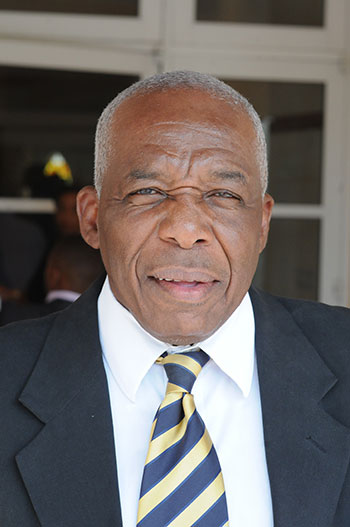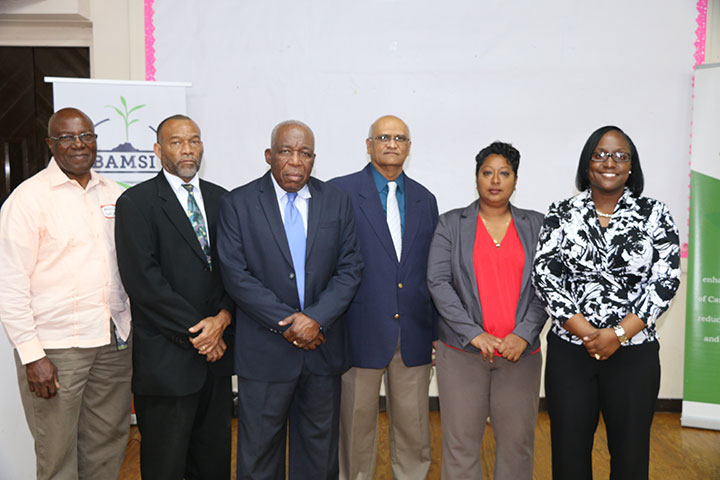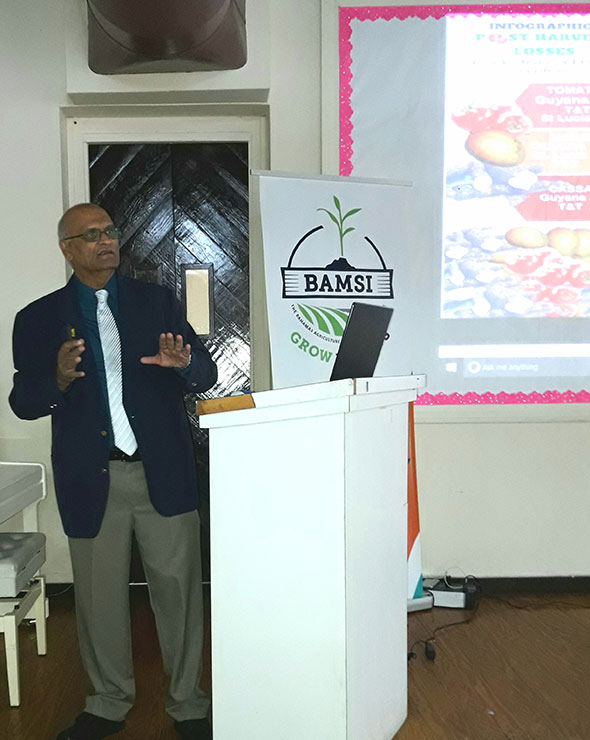|
From:TheBahamasWeekly.com Community
Presentation at Post Harvest Training Workshop St. Matthew’s Parich Hall Monday, 27th March, 2017 by Ambassador Wm. J. Godfrey Eneas, President The Bahamas Agriculture & Marine Science Institute (BAMSI): We live on a planet where millions are hungry not solely because they lack access to food but owing to the fact that tons of food is wasted. Food loss is a major issue for mankind. This is the situation at the Global level. At the Caribbean Region level we are a food deficit region meaning that we depend on others to feed us. Our food production systems are not producing enough food to meet our demand; hence food self-sufficiency is a major goal. We realize, however, that the quantities and types of food imported into our region are highly influenced by the fact that most of our economies are tourism driven. Tourism, particularly in The Bahamas, is determining our diet. Look at the number of American franchise operations in our midst. Nationally, what we eat is not consumer determined but importer driven and profit motivated. It is the food importer who, to a large extent, decides what we eat. This is the case because we are more interested in cost rather than quality. We have fallen prey to the “cheap food” syndrome. It is this cheap food which has created the health epidemic, commonly referred to as non-communicable diseases, i.e., cancer, diabetes, hypertension, the increased demand for dialysis treatment have made The Bahamas is possibly the highest health care cost centre not only in the region but among all Small Island Developing States (SIDS). We eat too much processed food with high salt, sugar and fat content. We have eaten ourselves sick. Our lifestyle is working against us. Our diet needs to revert to when we were a “fishing village.” The Tourism model which we have developed during the second half of the 20th century has been good for our economic growth and development but bad for our health. In the ‘90s, the then administration, the Ingraham government, embarked on, what I call, a “Duty Reduction Policy” which decimated the Agricultural Sector leading to the virtual elimination of our Poultry Sub-sector and Agri-businesses like food processing. Today, there is one commercial poultry operation – Abaco Big Bird and no commercial food processing entities – no canneries. We became a fresh fruit and vegetable producing country with the only value added content coming from principally the cottage industry level where food processing is a home-based activity. This scenario has made us extremely vulnerable to food loses leading to substantial food waste in our food production system. At the farmer and packing house levels, post-harvest loses are magnified. There is too much wastage. Further, the non-governmental organization (NGO), Hands for Hunger, is the chief entity engaged in the food salvaging business as it recycles enough food annually to provide100,000 meals through sourcing the hotels and gourmet restaurants in our Tourism Sector. The demand for Post-Harvest technology is badly needed and this will increase as we intensify our Import Substitution Policy and Progammes via our Associated Farmers’ Programme (AFP). The AFP network will reach every farming and fishing communities in our archipelago. Food waste must be minimized substantially if we are to eliminate hunger in our country and achieve food security. GLOBAL REALITY: Just last week the Caribbean Poultry Association indicated that Brazil supplies about 30% of the global poultry market which is 11.37M MT in 2017. Also, 33 of the 36 Brazilian slaughter plants have been closed to beef processing. In addition, the budget of the United States Department of Agriculture (USDA) in the 2017 Trump Budget has been reduced by 21%. Food costs will go up. We Bahamians need to brace ourselves for this eventuality. I mentioned earlier that hunger is a global challenge. It is also a Bahamian challenge as there are about 50,000 Bahamians living below our poverty level of $5,000 per annum. This is about $13 or $14 dollars per day in this environment of high food costs. Food is already unaffordable for thousands of us. According to a recent report by UNEP and the World Resources Institute (WRI), “about one-third of all food produced worldwide, worth around US$1 trillion, gets lost or wasted in food production and consumption systems. When this figure is converted to calories, it means that about 1 in 4 calories intended for consumption is never actually eaten. In a world full of hunger, volatile food prices and social unrest, these statistics are more than just shocking: they are environmentally, morally and economically outrageous. “Let’s start with some basic statistics about food waste in North America and around the world. “Worldwide Food Waste Facts: · Every year, consumers in industrialized countries waste almost as much food as the entire net food production of sub-Saharan Africa (222 million vs. 230 million tons) · The amount of food lost and wasted every year is equal to more than half of the world’s annual cereal crops (2.3 billion tons in 2009/10) “North American Food Waste Facts: · In the USA, organic waste is the second highest component of landfills which are the largest source of methane emissions · In the USA, 30-40 of the food supply is wasted, equalling more than 20 pounds of food per person per month” In The Bahamas, the figures are also staggering based on the role of Hands for Hunger is playing. POST HARVEST TRAINING WORKSHOP: This Post Harvest Training Workshop is BAMSI’s attempt to address the issue of eliminating food waste and to ensure the life of the food we eat, whether imported or locally grown maintains its nutritional value by avoiding deterioration on the shelf in the food store, in the kitchen or on the processing table. BAMSI will train and provide you with the tools to combat this aspect of food thus enhancing our food and nutrition security. Thank you for your participation.
Dr. Raveenia Roberts Hanna Welcome Speech to the Post Harvest Training Workshop St Matthews Parish Hall, Nassau Bahamas Monday March 27th, 2017 Herbert Spencer, A Noted Philosopher And Scientist Once Stated That “The Great Aim Of Education Is Not Knowledge But Action”: THE BAHAMAS AGRICULTURE AND MARINE SCIENCE INSTITUTE IS PLEASED TO HAVE YOU ALL HERE TODAY, NOT ONLY TO OBTAIN THE NEEDED TOOLS AND KNOWLEDGE OF THE DISCIPLINE OF POSTHARVEST BUT TO PUT THOSE TOOLS INTO ACTION AND HELP REDUCE THE LOSSES, BOTH PHYSICAL AND ECONOMIC, AND CREATE A MORE EFFICIENT FOOD VALUE CHAIN FOR THE BAHAMAS. A PLEASANT GOOD MORNING TO ALL AND WELCOME! WE ARE VERY EXCITED TO HAVE YOU ALL HERE TO PARTAKE IN THIS WEALTH OF INFORMATION. ONE OF THE GOALS OF THE INSTITUTE IS TO PROVIDE RELEVANT AND CUTTING-EDGE TECHNICAL EDUCATION IN AGRICULTURE AND MARINE SCIENCES AND OTHER RELATED AREAS. WE HAVE PARTNERED WITH THE UNIVERSITY OF THE WEST INDIES, ST AUGUSTINE’S, TRINIDAD CAMPUS AND THE CARIBBEAN AGRICULTURAL RESEARCH AND DEVELOPMENT INSTITUTE, CARDI TO DO JUST THAT. The overall workshop objective is to strengthen the capacity of all key stakeholders SUCH AS YOURSELVES and to raise YOUR awareness to address post harvest losses and waste through training In the development of efficient and sustainable post harvest handling systems for selected PRODUCE. This workshop will focus on enabling participants to understand the major causes of post harvest losses and waste, how to measure such losses and how to develop solutions to address them. IT IS aimed at improving the quality and quantity of fresh COMMODITIES produced in THE Bahamas for national, regional and export purposes throughout the food value chain. Given the need to better understand the strengths and weaknesses of the post harvest handling systems and to identify, plan and implement intervention strategies, policies and practices, this WORKSHOP WAS BORNE. The need to increase food production has become a policy mantra. Populations are growing, so we need more food. But much of what is produced never makes it past the farm gate, especially in developing countries. Eliminating those losses is a way to increase food availability without requiring additional resources or placing additional burdens on the environment. Post-harvest loss happens at every stage of the supply chain, both quantitative (physical losses caused by rodents, insects or infestations) and qualitative (loss of quality and value). The extent of these losses is substantial but measuring them can be notoriously difficult. GLOBAL Estimates range from 5 to 30% or more. This represents a vast amount of food, along with the wasted cost and effort of producing it. Reducing the incidence of post harvest losses along the food chain in the Bahamas will contribute to: improving food availability to address food insecurity, increasing economic access to food through job creation and income generation, development of efficient logistics systems to improve market access by delivering the right product at the right time. However, for success to be realized we should be constantly bridging the gap to reduce post harvest losses and food waste by applying new and innovative ideas in post harvest technology. This can be best achieved through a system which brings all those involved together to present management packages, identify current problems and causes of losses and to highlight relevant loss reduction solutions. This workshop is for YOU AND WE ARE PLEASED THAT YOU ARE HERE. See attached Dr Majeed Mohammed presentation - Introduction to Workshop Goals and Objectives
|


